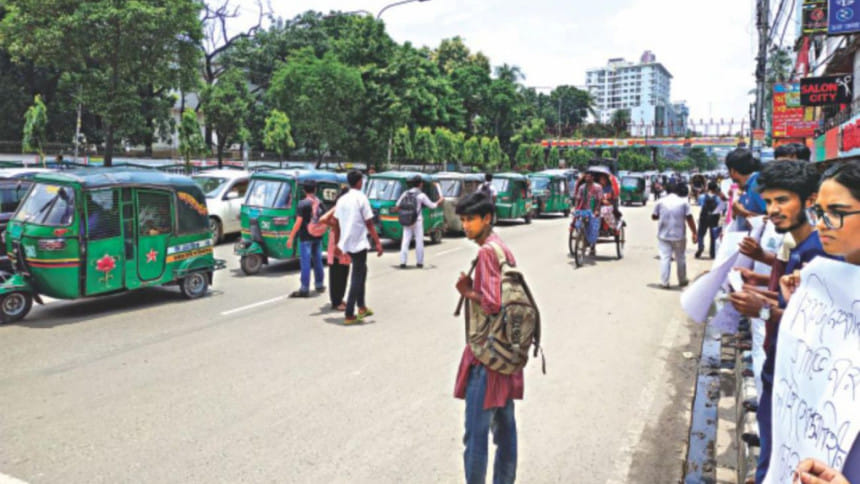Everyone has a role to play

Memories of the recent past, of school children campaigning to bring sanity and discipline on our roads, particularly in the capital city, are still fresh in the public mind. While the revelation of the extent of lawlessness in regulatory institutions and the deviant behaviour of responsible state functionaries was shocking and embarrassing, it was inspiring to see young minds striving to stall the rot and set things in the right direction.
The young Bangladeshis displayed admirable maturity by telling us that enough is enough and that disobedience of law cannot be a way of life.
Sadly enough, disobedience of traffic rules continues to be a malaise as evident from newspaper photographs of gross violations including dangerous jaywalking, flouting traffic signals, erratic driving, to mention a few transgressions. In metropolitan Dhaka, during the last two months, many cases for traffic rules violation have been registered and heavy fines have been imposed for infraction but indiscipline on the road continues. It appears that we have been more focused on the enforcement of laws and it would not be an exaggeration to view the responses as desperate reactive measures warranted by the anger and anguish of the suffering public.
On a point of illustration, there are reports from Dhaka Metropolitan Police Traffic Division that highlight the punitive measures during the two months of traffic awareness (from 1st August to 28th September) as under: i) Cases registered: 2,52,978; ii) Fines imposed: 16,57,62,459; iii) Number of actions against offending motorcyclists: 1,03,374; iv) Cases for driving in wrong direction: 19,979; v) Vehicles put on wrecker: 34,784; and vi) Vehicles dumped: 1,160.
While the above statistics show authorities' resolve to enforce laws and resultant collection of substantial amounts of revenue to the treasury, the unfortunate reality is that during the aforesaid drive period 15 human lives were lost in road accidents in addition to many crippling injuries. The tragedy is that order and discipline on the roads could not be restored in the desired manner. With regard to traffic management, one could say that enforcement has been partially successful but education is sadly lacking.
Experts tell us that traffic order and discipline principally relate to three 'E's: enforcement, engineering, and education. I am not sure as to how much of effective engineering intervention is possible to mitigate traffic woes on Dhaka's streets as of now. There is more than one opinion in our complex scenario characterised by multiplicity of modes of transportation and the known socio-political imperatives. There are time-bound recommendations to ease our traffic situation.
Under the abovementioned circumstances and recognising that isolated actions in one dimension will not produce durable results, is it not possible to mount a sustained campaign to educate the public about traffic discipline supplemented by strict enforcement of rules? The objective should be to culturally internalise the urgency of obeying the traffic rules as part of civilised existence. While this requires appropriate inclusion in educational curricula, the awareness campaign should be long-term and on a continual basis.
This can sound very idealistic but we may venture to find some public-spirited citizens who will volunteer to order their community out of a sense of duty. It should not be out of place to frame schemes whereby the energy and commitment of public-spirited citizens are harnessed towards bringing traffic order and assist the designated authority in the achievement of a common objective.
It is time to develop, nurture and sustain norms. Quite often many of us talk passionately about the admirable professional performance of the English police. What, however, we mostly fail to notice is that underneath the norms of English modern police service lies an assumption that the majority of citizens would obey the majority of laws for the majority of the time.
I am not oblivious to the complexity of traffic disorder and the solutions thereof. Surely, we require policy decisions regarding the number of private cars that can be allowed to ply on Dhaka's streets and how many speedy, economic and comfortable public transports should be there. We also need to do away with the slow-moving human-pulled transports gradually, at least from the arterial roads. The transport owners' myopia and selfish interests have to be tackled in public interest. The regulatory outfit of BRTA has to act appropriately and law enforcers have to perform in right earnest. All these are tall orders and definitely time-consuming.
Before substantive measures are taken to effectively alleviate the traffic ills, can we not discipline the visibly disturbing motorcyclists who would not submit to any pleadings? Rickshaws can be compelled to ply on one lane as they do in the cantonment area. Defaulting car drivers can surely be subjected to very heavy penalties to strike fear and obedience. Obedience of law would surely be painful but there is no alternative solution to traffic disorder. It is time to educate and enforce. Order and discipline on the roads will surely enhance our civilised credentials.
Muhammad Nurul Huda is a former IGP.





Comments